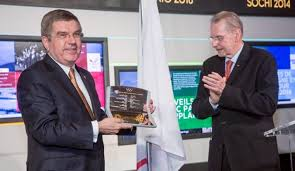
Ceremonial handover at the IOC: Jacques Rogge (right) hands over the key to his successor Thomas Bach (left)
Bach, who turns 60 a week from now, has started out in a way which suggests that he quickly wants to try to put to rest the suspicions and concerns that surrounded his election. As I noted in some articles prior to the election, there had been concerns related to Bach’s background as a protégé of Horst Dassler, the former Adidas boss, who was seen as the ‘Godfather’ of the corrupt aspects of sports marketing and power brokerage. Similarly, the notion that Bach was being pushed by the well-known ‘puppet master’ Sheikh Ahmad of Kuwait did not go over too well in many circles in the IOC and elsewhere in the world of sports.
So in a situation where, after 12 years, many had become disillusioned by the lack of achievements by the departing IOC president, Jacques Rogge, Bach has come into office with a lot to prove. Bach has been seen by many as a traditionalist and as a defender of key aspects of ‘status quo’, for instance by perennially being the IOC spokesman on the topic of the IOC’s strong insistence on autonomy for the sports movement. So for those who are looking for change, there were concerns. Among the changes that people have been hoping for, one could mention the composition of the IOC and the secret and stodgy nature of its work processes, the criteria and processes for the selection of Olympic host cities, the composition of the program for the Olympic Games, and the increasing sense of corruption and bad governance in international sports federations (IFs) and National Olympic Committees (NOCs).
Clearly, the IOC is first and foremost a ‘machine’ in charge of organizing the Olympic Games, moreover, with the recognition that such complex mega-events require a strong focus on its business aspects and the related politics. To a large extent, the respective IFs have a major role in ensuring the proper technical and sporting execution of the Games. But the IOC, as Bach clearly realizes, also has to be concerned with the image and credibility of the Olympic movement. Attention must be paid to issues such as corruption and doping. And the IOC would frantically hope that uncomfortable aspects such as anti-gay laws, abusive construction practices and worries about freedom the press at the upcoming Sochi games would not come to the forefront. Similarly, worries about political protests and delays in the preparations for Rio 2016 are dark clouds on the horizon. So Bach appreciates that bidding and selection processes will be critical in the future.
The continued justification for the existence of some traditional sports on the Olympic program is a hot topic, considering the realization, as just confirmed by Bach, that there is really no scope for expanding the number of participating athletes. And at the same time, there is a claim from many emerging sports who want to get their chance, something which also coincides with the IOC’s awareness that a modernization is needed in order to retain the interest among the younger generations. So the experience of the Youth Olympic Games, where some experimentation has been used, could become important. But there is also a balancing act in the sense that sponsors and TV rights holders will continue to insist on prominence for the well-established ‘cash cows’ on the program. Bach now seems to try to find a new way out, by discussing fine-tuning focused on specific events within the different sports, rather than just looking at additions and deletions of entire sports in the program.
Finally, I think it would be too optimistic to expect that Bach will take a new stand regarding the scope and propriety for the IOC to monitor and affect governance and corruption issues in IFs and NOCs. First, one must again keep in mind that the IOC is mainly focused on organizing the Olympic Games. Second, the ability of the IOC to serve as a role model or ‘police man’ given its own weaknesses in terms of membership and procedures is limited, although Bach seems intent on increasing IOC effectiveness, transparency and attention to ethics. Third, the potential for major conflicts and a weakening of the IOC’s ability to carry out its core functions would be enormous, if the IOC started intervening in the internal processes of the IFs and NOCs.
Yes, there is a tremendous need for such a role, and the IOC is theoretically well-placed, given its position at the top of the ‘matrix’ of IFs and NOCs. But for such role one would really need a separate WADA-like entity. Just perhaps there is some hope that Bach eventually would come to that conclusion. After all, he has explicitly recognized that the insistence on autonomy of the sports movement is tenable only if good governance and adherence to ethical principles can be demonstrated! So let us see what he means with his somewhat cryptic slogan: ‘unity in diversity’!
